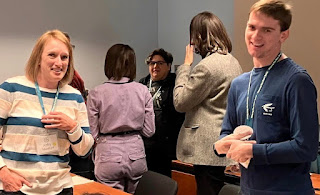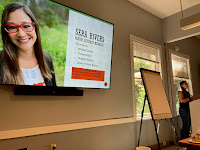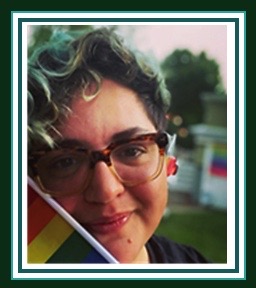Fall officially begins on Thursday, September 22. In reality, fall begins much earlier. The tomatoes and peppers in my garden know fall is coming. The birds and woolly bear caterpillars can tell, weeks before the official beginning of autumn. So when I began searching for mentor texts about fall, I looked for books that captured not just the season, but also that in-between-ness.
I lucked out when Buffy Silverman’s newest book landed on my desk
for a book review. Having seen the jacket image months ago, I was eager to read it.
On a Gold-Blooming Day: Finding Fall Treasures, by Buffy Silverman (Millbrook Press, 2022)
On a gold-blooming, bee-zooming, sun-dazzling day…
Snakes glide.
Spiders hide.
Crickets chirp.
Butterflies slurp.
Buffy’s lyrical language that just reels you into the changing season! She fills the page with verbs and color and sensory detail, all rolled into one luscious leaf pile just waiting for you to jump on. Then there are the large, bold photos and, of course, excellent back matter.
“So Buffy,” I asked, “do you use mentor texts?”
“Of course I do,” Buffy responded. “I am a believer in regular trips to the library to check out stacks of picture books. Reading helps put me in the mindset to write, even if the books are not related to the topic that I'm focused on.”
Me: What were some of the mentor texts you looked at?
Buffy: Some of the books that I remember reading when drafting On a Gold-Blooming Day include Douglas Florian's Autumnblings, Kenard Pak's Goodbye Summer, Hello Autumn; April Pulley Sayre's Full of Fall; Lola Schaefer's Because of an Acorn; and Loretta Holland's Fall Leaves.
I wrote the first draft of On a Gold-Blooming Day during my critique group's annual retreat. We couldn't spend time together during the summer of 2020, so we met on zoom for a few days. Each night we shared what we wrote during the day. Like many people, I had trouble finding motivation to write during the height of covid shutdowns. But peer-pressure is good motivation and inspiration.
Since I was writing a follow-up to On a Snow-Melting Day, I followed the pattern of that book. Writing the second book felt a bit like plagiarism--but I guess you can't plagiarize yourself! Many of the plants and animals featured in both books are ones that live near my house and that I observe and attempt to photograph. I live near a lake, woods, and field, so I included all three habitats.
Me: How did you collect such a wonderful assortment of words? I imagine you collecting words like I collect leaves, but where I press leaves between the pages of old encyclopedias, you probably stick post-its of verbs to the wall.
Buffy: I tend to do a lot of playing with word options as I write. For example, on my first draft I wrote:
On a leaf-chomping,
Romping, stomping, clomping, swamping, whomping
On a breeze-blowing/slowing/showing/crowing
wind-whistling, leaf-shaking/trembling
Tossing
And then landed on:
On a nut-crunching, leaf-lunching, hole-digging day...
It's possible that some of the words from mentor texts ended up in On a Gold-Blooming Day. They were certainly floating around in my head!
What’s really cool is that some of Buffy’s mentor texts were the same ones I’d dug up from the library stacks.
Summer Green to Autumn Gold: Uncovering Leaves’ Hidden Colors, by Mia Posada (Millbrook Press, 2019).
This book celebrates the colors of fall, and introduces the science behind leaf color. I love Mia’s artwork – here she combines watercolor and collage – and I love her use of language. Take this sentence: From emerald to jade and every shade in between, summer leaves fill the world with green.
Read it out loud, slowly enough to enjoy the internal rhymes (assonance) of jade and shade and between and green.
She does a good job explaining leaf pigments, how leaves separate from their twigs, and what happens to them once they fall. Then there is the back matter to consider: why deciduous trees lose their leaves, the various pigments in nature, and some hands-on activities.
Full of Fall, by April Pulley Sayre (Beach Lane Books, 2017)
Big photos, lyrical language. What’s not to love about an April Pulley Sayre book? Especially when the back matter explains each of the spreads in greater detail. Notes about chlorophyll and other pigments. A focus on midribs and leaf margins.
Goodbye Summer, Hello Autumn, by Kenard Pak (Henry Holt, 2016)
What’s fun about this book is that it’s a conversation between a girl and the trees (and flowers and creatures) she meets as summer turns to fall.
Hello, trees, she says as she heads off on a walk. And the trees answer: Hello! Now that the cool winds have come, we love how our branches sway in the sun.
Note to self: Be Playful!
Autumnblings, Poems and Paintings, by Douglas Florian (Greenwillow Books, 2003)
Normally, I seek mentor texts published within the last 5 years, but I have a soft spot for Florian’s books. They are just plain fun to read. Plus, poetry does not go out of date no matter how long a book’s been sitting on the shelf. Because I love to write lists, I was happy to see some list poems ~ couplets about “What I love about autumn”: apple picking, frisbee flicking…
If you’re seeking fall mentor texts, these are good ones to start with. Depending on what you write, your list of autumnal mentor texts may look different. Fortunately, there are bushel baskets full of books about fall and leaves and pumpkins…




















